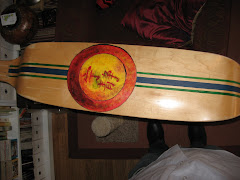Learning about myths helps in the creation of myths. When I began to sit down and write my myth, I found that I was using some of the details and examples from researching sacred places and I was able to incorporate these into my myth. I think that learning about any topic before you take the plunge into creating your own work is a good idea.
One of the main differences between creation and study of myths is the use of imagination. Everything is laid out in front of you when you read a myth, whether it be about the male or female divine, or a creation myth. When you create your own myth, though, the possibilities are limitless. The thing I like most about myth making is the level of creativity that you have. You can write about the creation of a pen from the ink of an octopus, or how the moon came to be because a lonely woman wanted to see her great-grand children. The possibilities are limitless.
Learning about myths, as well as writing my own, has helped me to start to think about the ways in which I will be teaching, not only myth, but English in general. For example, I found that contemporary examples of ‘sacred places’, my myth topic, helped both me and my targeted audience in understanding the different types of sacred places that exist. Also, getting your students interested and invested in the subject through planned group work, and getting up to act out a scene can really help instill the important characteristics of what you want your students to learn.
Friday, March 27, 2009
Tuesday, March 10, 2009
Poetry
Writing poetry requires a knack for looking at the world in unusual ways, for example, creating new and innovative ways to say the same thing. It requires a lot of the time and thought in order to create fresh expressions that will make a poem more aesthetically pleasing. In writing poetry, I’ve also found that contemporary poetry writes about an individual theme using a universal subject as the backdrop. If it sounds complicated, it is. With writing poetry, I don’t think it’s supposed to be easy. I think the writer is suppose to lose something when writing a poem, and this loss from the poet will be highlighted and will make the poem all the more rich for the audience to read.
In writing about poetry, the analyst has to be ready to go into a vague, richly detailed poem in order to show others what you got out of it. Writing about poetry can be just as difficult as writing poetry. For instance, when I was reading “Mont Blanc” by Percy Shelly, I couldn’t understand the poem for the life of me. It took my professor to almost shove my face in the poem and point to me what the poet was trying to get at. I think the perfect person to write about poetry is a poet, because a poet will have, at the very least, the basic tools and vocabulary to amply analyze a poem.
I guess what I’m saying is that those who want to write about poetry should write poetry themselves. This way, they will have that much more of an understanding of how to write about poetry.
In writing about poetry, the analyst has to be ready to go into a vague, richly detailed poem in order to show others what you got out of it. Writing about poetry can be just as difficult as writing poetry. For instance, when I was reading “Mont Blanc” by Percy Shelly, I couldn’t understand the poem for the life of me. It took my professor to almost shove my face in the poem and point to me what the poet was trying to get at. I think the perfect person to write about poetry is a poet, because a poet will have, at the very least, the basic tools and vocabulary to amply analyze a poem.
I guess what I’m saying is that those who want to write about poetry should write poetry themselves. This way, they will have that much more of an understanding of how to write about poetry.
Subscribe to:
Comments (Atom)

